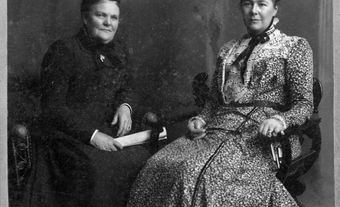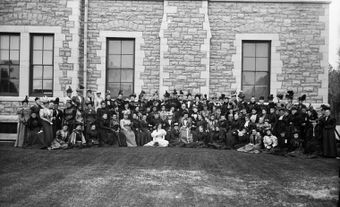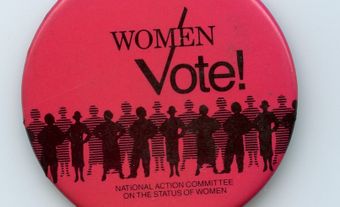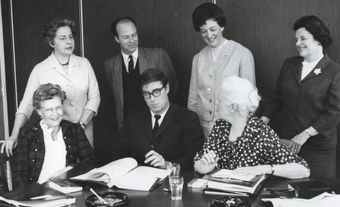Louise McKinney (née Crummy), Alberta MLA (1917–21), women’s rights activist, lay preacher (born 22 September 1868 in Frankville, ON; died 10 July 1931 in Claresholm, AB). Louise McKinney was the first woman elected to a legislature in Canada and in the British Empire. She was a member of the Woman’s Christian Temperance Union (WCTU) and a devout Methodist and prohibitionist. She was a pioneer suffragist and one of the Famous Five behind the Persons Case, the successful campaign to have women declared persons in the eyes of British law. She was also instrumental in passing Alberta’s Dower Act in 1917. However, her views on immigration and eugenics have been criticized as racist and elitist. She was named a Person of National Historic Significance in 1939 and an honorary senator in 2009.

Early life
Louise McKinney was born in the farming village of Frankville, Ontario. She was the sixth of 10 children in a strict Methodist family. A good student, McKinney dreamed of being a doctor, but circumstances did not permit. Instead, she attended Ottawa Normal School and trained to be a teacher. After seven years of teaching in Ontario schools, McKinney moved to North Dakota to live with her sister. McKinney found another teaching job in North Dakota and began to attend temperance meetings. She also became an organizer for the Women’s Christian Temperance Union (WCTU). Around this time, she met James McKinney, a fellow Ontarian and temperance activist. The two were soon married.
Woman’s Christian Temperance Union
The WCTU’s main objective was to protect the home from “evil” influences and to strengthen family life. Prohibition of alcohol and obtaining for women the right to vote were two of the WCTU’s ambitious goals. (See also Women’s Suffrage in Canada.)
In 1903, Louise and James McKinney moved back to Canada to a homestead near Claresholm, North-West Territories. The area later became part of Alberta. As devout Christians, the pair wasted no time in building the village’s first church. McKinney also founded the local chapter of the WCTU. She went on to establish branches of the WCTU across Alberta and Saskatchewan. She helped open more than 40 chapters in less than a decade.
McKinney not only organized WCTU events. She was also a popular public speaker who regularly took to the podium to discuss the evils of alcohol. She was also certain that one way to protect the family and make the world a better place was to give women the right to vote in federal elections.
Moving through the WCTU ranks, McKinney rose from member and chapter founder to president of the Alberta WCTU. She later went on to serve as vice-president of the Dominion WCTU (1908–30). As well, she took on the role of superintendent of one division of the WCTU — the Department of Scientific Temperance Instruction. Her mandate was to promote temperance education in schools. Addressing teachers, departments of education and the premiers of Saskatchewan and Alberta, McKinney and her colleagues attempted to organize school courses on the dangers of tobacco and alcohol. (See Alcoholism.) The goal was only partially reached, but McKinney’s efforts brought her into the political sphere.
McKinney travelled extensively as vice-president of the Dominion WCTU. She spoke to crowds in Canada, the United States, Europe and England. In 1916, Alberta became the third province to prohibit the sale of alcohol. This was due in large part to McKinney and her peers’ fierce campaigning. (In 1923, a provincial referendum ended prohibition in Alberta.)

Louise McKinney was the first woman elected to the Legislative Assembly of Alberta and the first woman elected to a legislative assembly in Canada or anywhere in the British Commonwealth.
Women’s Suffrage
In 1888, the Dominion WCTU endorsed women’s suffrage in Canada. Gaining the right to vote would provide the means to shape society and its laws according to their vision. This included the enactment of prohibition. McKinney campaigned for the franchise alongside her peers in the WCTU. On 13 October 1911, at a WCTU convention in Calgary, McKinney said, “Women’s franchise means home protection. In this age it is no longer possible for women to protect their homes from within. They must go outside and the best way for her to accomplish this protection is by ballot.”
On 19 April 1916, most women in Alberta won the right to vote and to hold provincial office. (First Nations women, however, did not obtain this provincial right until 1965.)
First Woman Elected to a Canadian Legislature
Elections for the Alberta Legislature were held in 1917. Louise McKinney’s name was on the ballot. She accepted the nomination as the Non-Partisan League candidate, because the other major parties received backing from the liquor industry. (See also Political Party Financing.) Holding to her convictions, McKinney won her seat on a prohibition platform.
McKinney was the first women to be elected to a Canadian legislature. On 7 June 1917, she won a seat in the Legislative Assembly of Alberta. She was also the first woman to be elected to a legislature in the British Empire. (See Commonwealth.) Another woman, Roberta MacAdams, a military nurse, was also elected in August 1917 as one of two Soldiers’ Representatives in the Alberta legislature. Both McKinney and MacAdams were sworn in on 7 February 1918.
As a Member of the Legislative Assembly, McKinney broadened her agenda to include social welfare for immigrants and widows. Along with Henrietta Edwards, she helped bring about the Dower Act, initiated by Magistrate Emily Murphy. It was vital legislation that protected a married woman’s property rights. (See Dower.)
McKinney ran for office again in 1921, as a member of the United Farmers of Alberta, but lost. She did not run for office again.
United Church Lay Preacher
Louise McKinney was deeply involved with her church. She served as an accredited lay preacher, superintendent of Sunday school and a leader in the Women's Missionary Society. Reverend George Webber, president of the Lord’s Day Alliance of Canada, said of McKinney: “In the pulpit her deep spiritual insight, her keen intellect, and her inspiring fervour combined to make her preaching ever welcome and fruitful.”
Women’s rights were always at the forefront of McKinney’s actions. As a lay preacher, she made the case for women to become ministers in the Methodist church and later in the United Church. However, her proposals were not approved.
In 1925, the Methodist Church, Presbyterian, Congregational and the General Council of the Local Union Churches were amalgamated into the United Church of Canada. McKinney was one of four women — among 346 men — who signed the religious union document.
Famous Five and the Persons Case
In August 1927, Emily Murphy, Canada’s first woman judge, invited Henrietta Edwards, Irene Parlby, Louise McKinney and Nellie McClung to a meeting at her Edmonton home. Murphy had carefully drafted a petition to put before the Supreme Court of Canada regarding the interpretation of the word persons in the British North America Act (now called the Constitution Act, 1867). At the time, women were not included in the definition of persons under the Constitution.
Murphy and the others signed the petition. Edwards’s signature appeared first; thus, the case was titled Edwards v. Attorney General of Canada. The petition asked the Supreme Court whether the word persons in Section 24 of the British North America Act, 1867 included women. If it considered women to be persons, the Constitution would allow for a woman to be appointed to the Senate.
Handing down the judgment on 24 April 1928, the Supreme Court denied the petition. The women — first called the “Alberta Five” and later the “Famous Five” — took their request to the Judicial Committee of the Privy Council in England (Canada’s highest court of appeal until 1949).
On 18 October 1929, after much deliberation, the Privy Council reversed the decision of the Supreme Court. It concluded that “the word ‘persons’ in sec. 24 does include women, and that women are eligible to be summoned to and become members of the Senate of Canada.” Lord Sankey, who delivered the judgement on behalf of the Privy Council in what became known as the Persons Case, also remarked that the “exclusion of women from all public offices is a relic of days more barbarous than ours […] and to those who ask why the word [persons] should include females, the obvious answer is why should it not.”
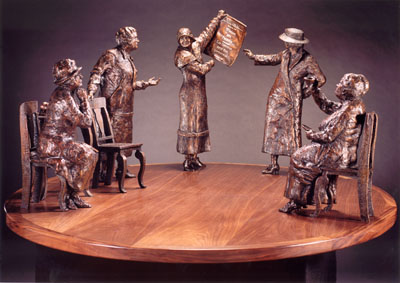
McKinney was appointed vice-president of the Imperial Order Daughters of the Empire, an imperialist women’s group. After the revolutionary decision of the Persons Case, she remained fully occupied with WCTU business. In 1931, she was elected president of the Dominion WCTU. In June 1931, she was named first vice-president of the World’s Women’s Christian Temperance Union at its international convention in Toronto, which she hosted. About 1,500 delegates from around the world were in attendance.
Eugenics
Like other members of the Famous Five, Louise McKinney has been criticized as being elitist and racist, and for supporting the eugenics movement. Eugenics was a pseudoscience that subscribed to the idea that the human population could be improved by controlling reproduction. Many influential Canadians, including J. S. Woodsworth, Dr. Clarence Hincks and Tommy Douglas, supported eugenic ideas in the early 1900s. ( See Tommy Douglas and Eugenics.) They promoted both “positive” eugenics (promoting the breeding of “fit” members of society) and “negative” eugenics (discouraging procreation by those considered “unfit”). Eugenicists argued that “mental defectives” and the “feeble-minded” were prone to alcoholism, promiscuity, mental illness, delinquency and criminal behaviour, and therefore posed a threat to the moral fabric of the community. These concerns led to increasing support for eugenic legislation, including the sterilization of “defectives.”
Though her personal views on compulsory eugenic sterilization are not known, McKinney did support the eugenics movement in Alberta in other ways. She promoted stricter immigration laws as a means to keep out unwanted, often racialized, individuals. She also lobbied for the creation of institutions for “mental defectives” — seen as a means to prevent institutionalized persons from reproducing.
Sexual sterilization laws were passed in Alberta (1928–72) and British Columbia (1933–73). During that time, thousands of people deemed “psychotic” or “mentally defective” underwent forced sterilization. A disproportionate number of them were Indigenous women. (See also Sexual Sterilization of Indigenous Women in Canada.)

Legacy
A short time after she returned to her home in Claresholm, Alberta, from the World’s WCTU convention in Toronto, Louise McKinney fell ill. She died on 10 July 1931, at age 63.
McKinney made an enduring mark in women’s rights and social welfare. In 1939, she was named a Person of National Historic Significance by the Government of Canada. In October 2009, 80 years after the Persons Case, the Senate voted to recognize the Famous Five as honorary senators. It was the first time the Senate had bestowed such a distinction.
See also National Council of Women of Canada; Women’s Movements in Canada; Status of Women; Royal Commission on the Status of Women in Canada; Council on the Status of Women; Women and the Law; Women’s Organizations.

 Share on Facebook
Share on Facebook Share on X
Share on X Share by Email
Share by Email Share on Google Classroom
Share on Google Classroom
